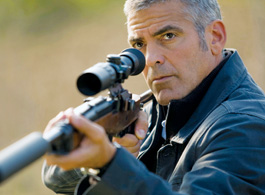home | metro santa cruz index | film review

Photograph by Giles Keyte
SHOOT OUT OF LUCK: Holed up in an Italian town and put on a weapon-making detail, George Clooney's Jack runs into trouble in 'The American,' opening Sept. 1.
Solitary Man
'The American' is as much psychological study as action-packed spy flick
By Richard von Busack
THERE'S AN alternate film version of Camus' The Stranger somewhere in which Meursault, having proven his ability to kill without feeling, gets hired by the French secret service. The slow-cooked existential spy movie The American breaks no new philosophical ground in this regard, though it has the true resonance of the spy movie: that summing up of men's alienation, fear of betrayal and terror of entanglement.
The Dutch director Anton Corbijn, veteran of many a music video, directs in a classic, neo-'60s style that has nothing of MTV in it. The American's old-fashioned duo-tone film poster should be a tip-off. Martin Ruhe (who shot Corbijn's biopic Control as well as Harry Brown) soaks this film in the oranges and blues that are essential to the era of digital tweaking. The film's nocturnes are a bit more heightened: at night the stony labyrinths of the village start glowing shades of lunar green and polished copper.
Much of The American is an act of following: Corbijn keeps the most interesting male movie star in the world in his scopes. We don't know his past, but the tattoos tell of some time in the military, and a stylized butterfly between the shoulder blades shows a lepidopterist turn of mind. He walks through medieval streets, fiddles with a metal drill press as he builds a weapon and looks over his shoulder for those who might be looking for him.
George Clooney here is called Jack. In the pre-titles, he is run out of a snowy haven in Sweden by killers, then flees to Italy to hide from them. Apparently, the only man who knows his whereabouts is his employer, who warns him to make no friends in his new village. Despite himself, it happens: Jack meets an elegant hooker called Clara (Violante Placido) and starts sharing drinks with a rumbling local priest. The priest is played by Paolo Bonacelli, who has a memorable face, but I couldn't recall any work he'd done offhand; turns out he was the old man of God Roberto Benigni killed with his obscene patter in Jarmusch's Night on Earth, and he was the Duke in Pasolini's Salo.
This man and this woman, reaching out to body and soul, compromise Jack's perimeter. And then Jack is recruited for one last job before retirement: the construction of a sniper rifle for a striking-looking female assassin (Thekla Reuten, from In Bruges).
Martin Booth's source novel A Very Private Gentleman (2004) is literary, florid and sardonic. The Browning you think of when you read it is the poet, not the rifle; the middle-aged British gentleman of the book poses as a watercolorist of butterflies. He is, he tells us, "not a James Bond."
Which is immaterial as well as disingenuous. Even those who really know James Bond's lore have no idea who James Bond is. Take away the outline made by 007's famous possessions, female companions and wardrobe, and there's a sizable existential blank that any artist could fill.
Booth, who was a poet more than a plotter, is most fascinated with the case of a man trying to cut off all ties to the world, social and moral. The Italian hilltop town in Abruzzo described in humid summer by Booth is far up in the clouds onscreen, looking chilly, inaccessible and more like Tibet than Tuscany. It is compelling to watch Clooney pacing these ancient stones in fascinating solitude, quivering with alertness.
But it's not at all the thriller a lot of people will expect. Ultimately, because of its sexual content and its meditative strength—not to mention the large part of an audience that can never take even a somber spy movie seriously—it may be Americans who have the most trouble with it.
THE AMERICAN (R; 113 min.), directed by Anthony Corbijn and starring George Clooney, Violante Placido, Paolo Bonacelli and Thekla Reuten, opens Friday.
Send letters to the editor here.
|
|
|
|
|
|